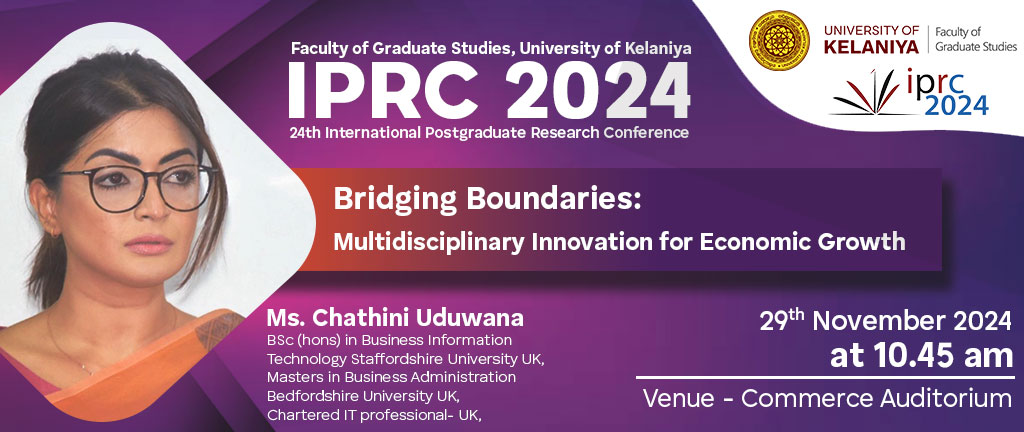Ms. Chathini Uduwana

“Chathini Uduwana is the Country Head and Vice President of Typefi Systems, a renowned global publishing automation company. In 2014, she established Typefi Systems in Sri Lanka and has since played a key role in its growth and success. She is an executive member of Typefi Global, which maintains offices in Australia, the USA, the UK, the Netherlands, and Sri Lanka. Chathini Uduwana is the Women in Tech Sri Lanka Ambassador. She has earned a Bachelor’s Degree in Business Information Technology from Staffordshire University and an MBA from Bedfordshire University. Additionally, she is a Chartered IT professional (CITP). ”
Abstract
Abstract Title - Bridging Boundaries: Multidisciplinary Innovation for Economic Growth
Sri Lanka stands at a transformative crossroads where research, innovation, and multidisciplinary collaboration are critical to driving sustainable economic growth. In today’s interconnected world, the challenges of economic development—whether in healthcare, technology, or gender equality—require solutions that transcend traditional academic silos. By integrating diverse perspectives, we can foster innovation that propels productivity and addresses societal challenges in meaningful ways.
Artificial intelligence (AI) and digital transformation present a unique opportunity to reshape sectors such as agriculture, tourism, healthcare, education, and public governance. Although Sri Lanka’s AI adoption is still emerging, strategic investments aligned with the Digital Strategy 2030 could unlock immense potential. For instance, precision farming and AI-powered disease diagnostics can enhance agriculture and healthcare, respectively, while smart technologies can personalize tourism experiences and democratize education. However, the success of AI lies not only in algorithms but in how individuals, communities, and organizations adapt to new technologies—creating opportunities without deepening social divides.
My own experiences in digital transformation initiatives have underscored the importance of combining technological, social, and economic insights. Gender equality is a crucial focus, especially regarding workforce participation. Through initiatives like ‘She Returns,’ which supports women re-entering the workforce after maternity leave, we see how multidisciplinary research can solve real-world challenges by bridging gaps in productivity and equality.
Academia plays a pivotal role in encouraging cross-disciplinary innovation. However, achieving this requires shifting from specialization to integration, breaking institutional barriers, and promoting collaboration. It is only through collective effort—where technologists, economists, sociologists, and policymakers join forces—that we can shape a prosperous future.
In conclusion, Sri Lanka’s path forward embraces innovation and research that transcends boundaries. Together, we can build a resilient economy driven by inclusive growth, ensuring that research not only advances knowledge but also transforms lives and creates lasting societal impact.

